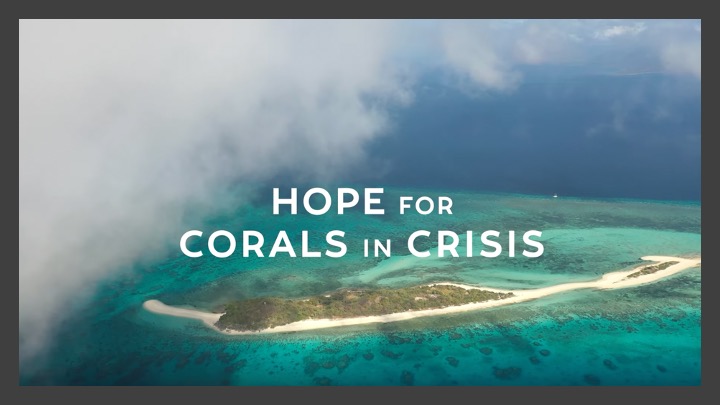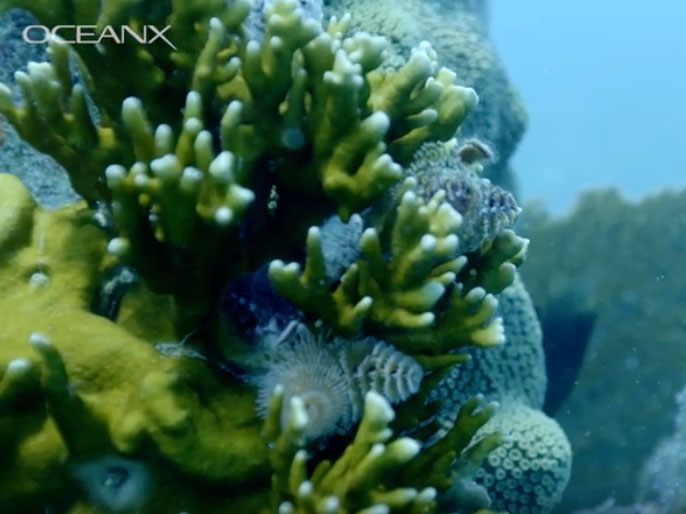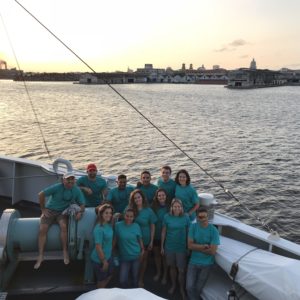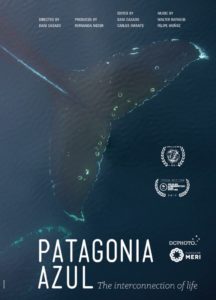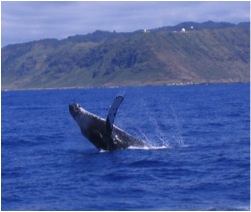Science Communications
In the Apprill lab, we strive to communicate our research in ways that the public and our youth can understand. We often partner with specialists including journalists and film makers to bring our science to you. Our communication pieces include (in order from recent - past):
Video
Hope for Corals in Crisis
Coral reefs around the world are facing a dangerous decline, but there is still hope! This behind-the-scenes video highlights some of the novel technologies and approaches WHOI researchers are developing to detect and diagnose at-risk corals before any visible signs of damage when there is still time to intervene. The complexities of these dynamic coral reef ecosystems require solutions that are rooted in collaboration across disciplines. Researchers highlighted in this film include: Amy Apprill – Microbial Ecologist Aran Mooney – Sensory Biologist Colleen Hansel – Marine Chemist Yogi Girdhar – Underwater Roboticist Read more about WHOI’s Reef Solutions Initiative: https://www.whoi.edu/oceanus/feature/...
Produced, Directed, Shot, and Edited by Craig LaPlante Underwater Videography provided by Dan Mele Additional video provided by Danny Hentz Graphic Design by Riley Orlando Production assistance provided by Veronique LaCapra Ken Kostel Jayne Doucette © Woods Hole Oceanographic Institution
Ocean Encounters: Corals in Crisis
Six years ago, a deadly coral disease outbreak started in Florida and has now made its way to the coral reefs in U.S. Virgin Islands, killing corals at an unprecedented rate. Hear what three scientists are doing to help save corals and the spectacular ecosystems they support. Speakers: Marine biologist, ocean explorer, and conservationist Sylvia Earle, University of the Virgin Islands coral disease ecologist Marilyn Brandt, and WHOI marine microbial ecologist Amy Apprill.
Reef On Fire: The Strange Disease Spreading through Florida's Corals
In the past 70 years, #coral cover in the iconic Florida Keys, has dropped from 50 percent to five percent and is predicted to fall even lower thanks to a brand-new villain known as "stony coral tissue loss disease."
Coral Reefs' Last Stand: Cuba
A 20-minute video documentary produced by Project Earth and Fusion about our unprecedented expedition to partner with Cuban scientists and explore the Gardens of the Queen coral reefs in Cuba.
Patagonia Azul
A short documentary produced by Daniel Casado which showcases the science, conservation and education goals of Fundacion Meri. The film features the science on the blue whales of Patagonia, Chile, including our work to examine the blow-associated microbiomes of blue whales.
The Humpback Microbiome
An 8-minute video documentary produced by Science magazine that is part of the XX Files, focusing on Extraordinary Science by Extraordinary Women. The video explains the research our laboratory is conducting on the microbiomes of humpback whales.
News and Press Releases
Seawater microbes offer new, non-invasive way to detect coral disease. WHOI press release. January 20, 2026.
Why scientists are catching whale breaths....with drones. National Public Radio “Short Waves” program. December 26, 2025.
What can a whale’s breath tell us? According to a new study, a lot about its health. WHOI press release. November 12, 2025. Featured in 163 media hits including USA Today, CBC News, Earth.com, BBC Wildlife, NPR WCAI, CBC National “As it Happens”, Boston 25 6pm Newscast. Total household audience reach of 540,689,812.
Microbial monitoring in reef waters offers accessible tool for ecosystem management. Phys.org. May 16, 2025.
The Race to Engineer Coral Reef Solutions in the U.S. Virgin Islands. Inside Climate News. June 9, 2025.
Fish "Beauty Salons" Offer Insight into How Microbes Move Within Reefs. UC Davis press release. June 5, 2025.
Seawater microbes are a powerful tool for diagnosing coral reef health and strengthening conservation efforts, according to new paper. WHOI Press release. May 16, 2025.
Best practices in marine mammal research: developing a toolkit for sample collection and preservation. University of Washington press release. June 24, 2024.
Scientists ‘read’ the messages in chemical clues left by coral reef inhabitants. American Chemical Society press release. June 6, 2024.
Sonic Youth: Healthy Reef Sounds Increase Coral Settlement. WHOI press release. March 13, 2024.
Study: eDNA methods give a real-time look at coral reef health. WHOI press release. April 5, 2024.
Innovative Techniques Provide New Means to Monitor Coral Reef Health. WHOI press release. September 21, 2023.
Innovative Techniques Provide New Means to Monitor Coral Reef Health. WHOI Press release. September 21, 2023.
Researchers propose a new technology-centered focus to study and conserve coral reefs. WHOI Press release. April 4, 2023.
Northern star coral study findings could help protect tropical corals. NSF Press release. May 20, 2021.
Northern Star Coral Study Could Help Protect Tropical Corals. WHOI Press release. April 13, 2021.
Corals in Crisis. Virtual WHOI Ocean Encounters event with Sylvia Earle, Marilyn Brandt and Amy Apprill. June 3, 2020. Over 1600 attendees and 600+ questions submitted.
Summer’s coming: Will Cape Cod beaches be safe? OceanInsights article by Evan Lubofsky | April 14, 2020
How microbes reflect the health of coral reefs. WHOI Press release. December 19, 2019.
My team uses crossbows and drones to collect bacteria from whales – and the results are teaching us how to keep whales healthy. Amy Apprill, The Conversation. December 17, 2019.
WHOI-engineered DISCO allows scientists to measure highly reactive superoxide on coral reefs. December 12, 2019.
Whales may owe their efficient digestion to millions of tiny microbes. WHOI Press release. December 4, 2019.
Mystery disease is killing Caribbean corals. Cassie Martin, ScienceNews. August 29, 2019.
Virgin Islands Corals in Crisis. WHOI press release. May 7, 2019.
New study finds distinct microbes living next to corals.
WHOI Press release. May 21, 2019.
Coral larvae use sound to find a home on the reef.
WHOI Press release. December 12, 2018.
The Unseen World on Coral Reefs. A hidden microbioe underlies health of reef ecosystems.
Laura Castañón, Oceanus magazine. September 18, 2018.
World Ocean Day: 10 things to know about coral reefs and their microbiomes.
Cheryl Dybas, National Science Foundation. June 5, 2018.
Humpback whale microbiome changes with the seasons.
Nature Microbiology Journal Club by Ben Libberton. February 15, 2018.
Monitoring bacteria on whale skin.
WHOI Press release. February 14, 2018.
On a Cuban reef, a precarious partnership on scientific research.
Diane Toomey, Yale Environment 360. December 20, 2017.
Like Nothing Else in the Caribbean: A rare look at Cuba’s coral reefs. NPR radio interview with Amy Apprill. December 7, 2017.
In the Gardens of the Queen: Joint U.S.-Cuban expedition explores pristine Cuban coral reefs.
Lonny Lippsett, Oceanus magazine. November 22, 2017.
Study identifies whale blow microbiome.
WHOI Press release. October 10, 2017.
Study reveals corals’ influence on reef microbes.
WHOI Press release. October 12, 2016.
New studies take a second look at coral bleaching culprit.
WHOI Press release. December 7, 2016.
